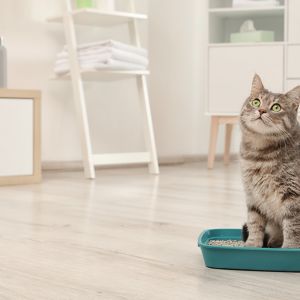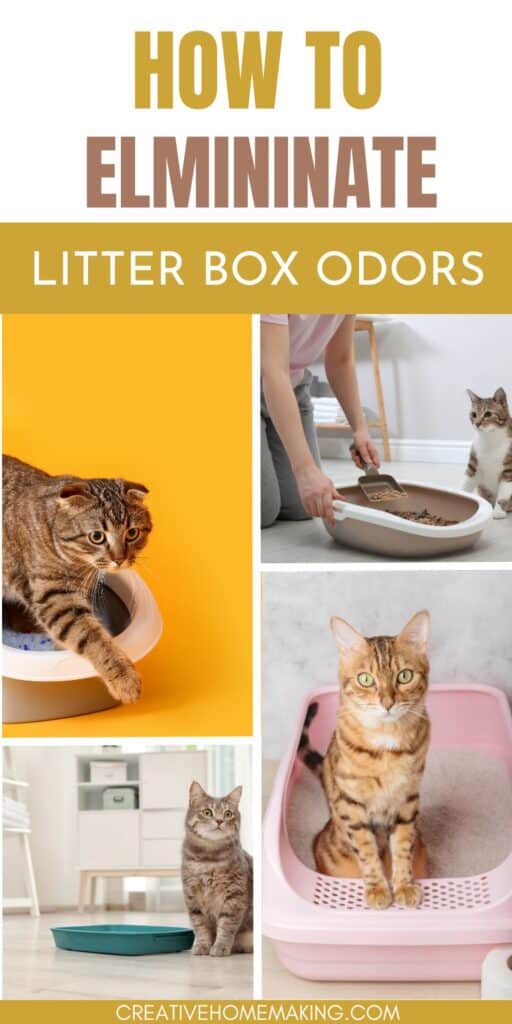Keeping a litter box clean and odor-free is a top priority for any cat owner. The smell of a litter box can quickly become overwhelming and unpleasant, not just for the cat but also for the owner and anyone else in the house. Fortunately, there are several simple steps that can be taken to eliminate litter box odors.
This post may contain affiliate links.
The first and most important step is to clean the litter box frequently. This means scooping out the solids and liquid clumps at least twice a day, and replacing the litter entirely once a week.
For those who don’t use clumping litter, a large, solid metal spoon can be used to lift out any solid waste. In addition to cleaning the litter box itself, it’s also important to regularly clean the surrounding area to prevent any lingering odors.
Related Article: Say Goodbye to Old Cat Urine Odor with These Home Remedies
Another helpful tip is to use a litter box with a lid and a carbon filter, which can help to trap odors and keep them from spreading throughout the house.
Why Litter Boxes Smell
Litter boxes are an essential part of owning a cat, but they can quickly become a source of unpleasant odors. Understanding why litter boxes smell can help you take the necessary steps to keep your home smelling fresh and clean.
One of the main reasons litter boxes smell is due to the buildup of cat urine and feces. When left in the box for too long, bacteria can grow and multiply, leading to an unpleasant odor. Cat urine, in particular, contains a high concentration of ammonia, which can be overpowering and unpleasant.
Another reason litter boxes can smell is due to poor ventilation. If the litter box is located in a small, enclosed space, odors can quickly become trapped and build up. Additionally, if the litter box is not cleaned frequently enough, the odor can become more intense.
Related Article: How to Get Cat Pee Smell Out of Couch: A Comprehensive Guide
There are several ways to combat litter box odor and keep your home smelling fresh. One of the most important things you can do is to clean the litter box regularly.
This means scooping out any solid waste and clumps of litter at least twice a day, and completely replacing the litter and cleaning the box at least once a week.
In addition to regular cleaning, there are several odor control products available on the market. These products can include deodorizing sprays, litter additives, and air purifiers.
However, it is important to note that some of these products may contain chemicals that can be harmful to your cat, so it is important to read the labels carefully and use them as directed.
Choosing the Right Litter Box
When it comes to keeping the litter box from smelling, choosing the right litter box is crucial. There are different types of litter boxes available in the market, and each has its own advantages and disadvantages.
In this section, we will discuss the different types of litter boxes and what to consider when choosing the right one for your cat.
Related Article: How to Remove Cat Urine Smell from Carpet for GOOD
Covered vs. Uncovered Litter Boxes
Covered litter boxes can help contain the odor and litter mess, but some cats may not like the enclosed space. Uncovered litter boxes are more accessible and easier to clean, but they don’t provide as much privacy. It’s important to consider your cat’s preferences and behavior when choosing between covered and uncovered litter boxes.
Self-Cleaning Litter Boxes
Self-cleaning litter boxes can make your life easier by automatically scooping and disposing of waste. However, they can be expensive and may not work for all cats.
Some cats may be scared of the noise or movement, and some may not like the feel of the automatic rake. It’s important to introduce your cat to the self-cleaning litter box slowly and monitor their behavior.
Related Article: How to Clean Cat Vomit from Carpet
Multiple Litter Boxes
Having multiple litter boxes can help reduce odor and mess, especially in multi-cat households. It’s recommended to have one litter box per cat, plus one extra.
This ensures that each cat has enough space and privacy, and reduces the likelihood of territorial disputes. It’s also important to place the litter boxes in different locations to provide
Litter vs. Crystal Cat Litter
Clumping litter is the most popular type of cat litter. It is made from bentonite clay, which clumps together when it comes into contact with liquid. This makes it easy to scoop out the waste and keep the litter box clean.
However, clumping litters can be dusty, and the clumps can break apart when scooped, leaving behind small pieces that can stick to your cat’s paws and spread around the house.
Crystal cat litter is made from silica gel, which absorbs moisture and odors. It does not clump together like clumping litter, but it is still easy to scoop out the waste.
Crystal cat litter is less dusty than clumping litter, and it lasts longer, which means you need to change the litter less frequently. However, crystal cat litter is more expensive than clumping litter.
Scented Litter
Scented litter is designed to mask the odor of cat waste. It comes in a variety of scents, including lavender, citrus, and pine. However, scented litter can be overpowering and unpleasant for some cats.
It can also cause respiratory problems for cats with sensitive noses. If you decide to use scented litter, make sure to choose a mild scent and monitor your cat’s behavior to ensure they are not having any adverse reactions.
When choosing the right cat litter, consider your cat’s preferences and needs. Some cats prefer a particular type of litter, while others may be more tolerant. It is also important to consider
Cleaning and Scooping the Litter Box
How Often to Clean the Litter Box
Cleaning the litter box is a crucial aspect of keeping it from smelling. While scooping the litter box daily is essential, you should also be regularly cleaning the entire box.
Experts recommend completely emptying the litter and scrubbing the box at least once every week. Some cat owners may have to clean the litter box 2 or more times each week if there are multiple cats using the same litter box.
How to Scoop the Litter Box
Scooping the litter box daily is essential to keep the box clean and odor-free. Use a commercially-available litter scoop to remove all visible clumps of urine and feces from your cat’s litter box on a daily basis.
This helps ensure that the litter box remains clean for your cat’s use, while also helping to control odors associated with urine and feces.
Deodorizing the Litter Box
Deodorizing the litter box is crucial to keep it from smelling. There are several ways to deodorize the litter box, including using a litter box deodorizer, activated charcoal, vinegar, bleach, enzymatic cleaner, and sponge.
- Litter box deodorizer: A litter box deodorizer can be sprinkled on top of the litter to help absorb odors. It is usually made of natural ingredients and is safe for cats.
- Activated charcoal: Activated charcoal can be placed in a small bowl inside the litter box to absorb odors. It is safe for cats and can be reused for up to a month.
- Vinegar: A mixture of water and vinegar can be used to clean the litter box. Mix equal parts of water and vinegar and use it to scrub the litter box. Rinse the box thoroughly with water and dry it before adding fresh litter.
- Bleach: A solution of bleach and water can be used to disinfect the litter box. Mix 1/4 cup of bleach with 1 gallon of water and use it to scrub the litter box. Rinse the box thoroughly with water and dry it before adding fresh litter.
- Enzymatic cleaner: An enzymatic cleaner can be used to break down the odors in the litter box. Spray the cleaner on the litter box and let it sit for a few minutes before wiping it off with a sponge.
- Sponge: A sponge can be used to clean the litter box. Wet the sponge and use it to scrub the litter box. Rinse the box thoroughly with water and dry it before adding fresh litter.
By following these tips, you can keep your litter box clean and odor-free.
Maintaining a Well-Ventilated Area
One of the most effective ways to keep litter box odors at bay is to maintain a well-ventilated area. A well-ventilated area will help to reduce the humidity and moisture levels in the litter box, which can contribute to unpleasant smells. Here are a few tips for maintaining a well-ventilated area:
- Choose a dry location: When selecting a location for the litter box, choose a dry area with good air circulation. Avoid placing the litter box in a damp or humid area, such as a basement or laundry room, as this can exacerbate odors. Instead, choose a location with good ventilation, such as a bathroom or utility room.
- Use an air purifier: An air purifier can help to remove odors and allergens from the air, creating a more pleasant environment for both you and your cat. Look for an air purifier with a HEPA filter, which can capture small particles and pollutants, including pet dander and litter box odors.
- Clean the area regularly: In addition to cleaning the litter box itself, it’s important to clean the surrounding area regularly. Sweep or vacuum the area around the litter box daily to remove any litter or debris that may have been tracked out of the box. Wipe down any surfaces with a mild cleaner to remove any lingering odors.
- Consider a litter box enclosure: A litter box enclosure can help to contain odors and provide additional ventilation. Look for an enclosure with ventilation holes or a built-in fan to help circulate air.
By maintaining a well-ventilated area, you can help to reduce litter box odors and create a more pleasant environment for both you and your cat.
Follow my cleaning hacks board on Pinterest.



